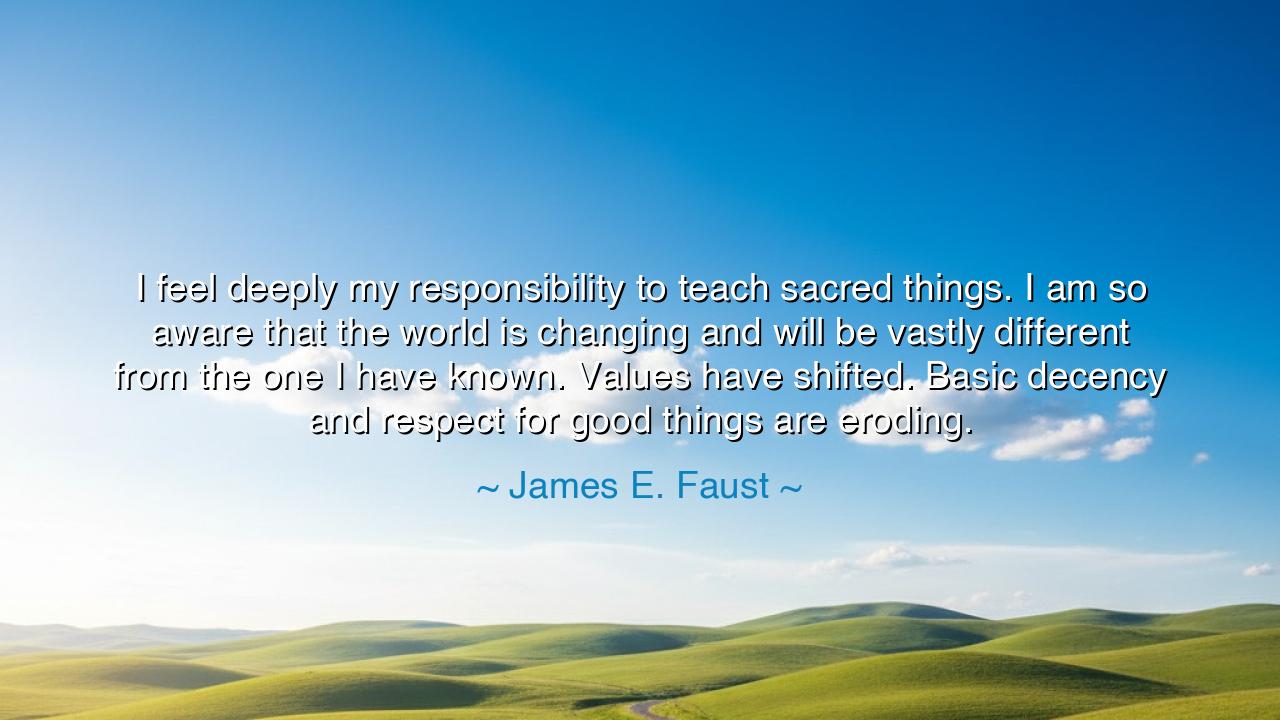
I feel deeply my responsibility to teach sacred things. I am so
I feel deeply my responsibility to teach sacred things. I am so aware that the world is changing and will be vastly different from the one I have known. Values have shifted. Basic decency and respect for good things are eroding.






Hear, O children of light and seekers of truth, the solemn words of James E. Faust, who declared: “I feel deeply my responsibility to teach sacred things. I am so aware that the world is changing and will be vastly different from the one I have known. Values have shifted. Basic decency and respect for good things are eroding.” These words, like the toll of a bell at dusk, awaken us to the truth that every generation stands at the edge of a crumbling order, tasked with either watching it fade or lifting it anew. In them we hear both sorrow for what is lost and a clarion call to guard what is holy.
The origin of this saying lies in Faust’s service as a spiritual leader during an age of rapid transformation. He bore witness to a century in which traditions were questioned, morality was often cast aside for convenience, and the enduring values of faith, decency, and respect seemed to be fading from the hearts of many. Yet instead of despair, he chose responsibility—the duty to teach, to preserve, and to remind humanity that there are truths which no age has the right to discard.
To speak of sacred things is to speak of what transcends time: honesty, compassion, fidelity, reverence, love, and justice. These are not the shifting fashions of a single generation, but the eternal pillars on which human society stands. Faust laments that these pillars are being neglected, chipped away by selfishness and the pursuit of pleasure, leaving the edifice of civilization trembling. Yet his words are not only mourning—they are also instruction. For he affirms that the first defense against decay is teaching, the act of passing on truth before it is forgotten.
History itself has seen this drama unfold. Consider the fall of Rome, where the grandeur of empire was hollowed out by the erosion of civic virtue, indulgence replacing duty, spectacle replacing wisdom. Or recall the words of Confucius, who in a time of chaos urged the people to return to respect, filial duty, and moral order, knowing that without these the state could not endure. Again and again, when decency waned, societies faltered; when values were renewed, they flourished. Faust’s warning stands in this same tradition of voices crying out against decline.
The deeper meaning of his words is that each of us, in our own way, is a teacher of the sacred. Whether we lead nations, families, or simply our own lives, we bear the responsibility to demonstrate through word and deed what is good, what is just, what is worthy of honor. If we remain silent, the world will drift further into erosion; but if we live with integrity, then even in times of decay, seeds of renewal will be planted.
The lesson is plain: do not surrender to the belief that the shifting of the world makes values obsolete. Technology changes, cultures evolve, but basic decency—the respect for others, the cherishing of truth, the defense of good—remains eternal. To teach these things is to preserve humanity itself. And if you think yourself too small to teach, remember that every act of kindness, every stand for truth, every reverence for the sacred is itself a lesson to the watching world.
Therefore, O listeners, let your practice be this: hold fast to what is sacred, and teach it by your life. Speak truth even when others are silent, honor goodness even when others mock it, and live with respect even when the world forgets. For the erosion of values is not inevitable—it is stopped when men and women choose to stand firm, like stones unmoved by the tide.
Thus let Faust’s words endure: “I feel deeply my responsibility to teach sacred things… Basic decency and respect for good things are eroding.” They are not a lament alone, but a command. Let us heed them, and in doing so, become guardians of the sacred flame, passing it unbroken into the hands of generations yet to come.






AAdministratorAdministrator
Welcome, honored guests. Please leave a comment, we will respond soon